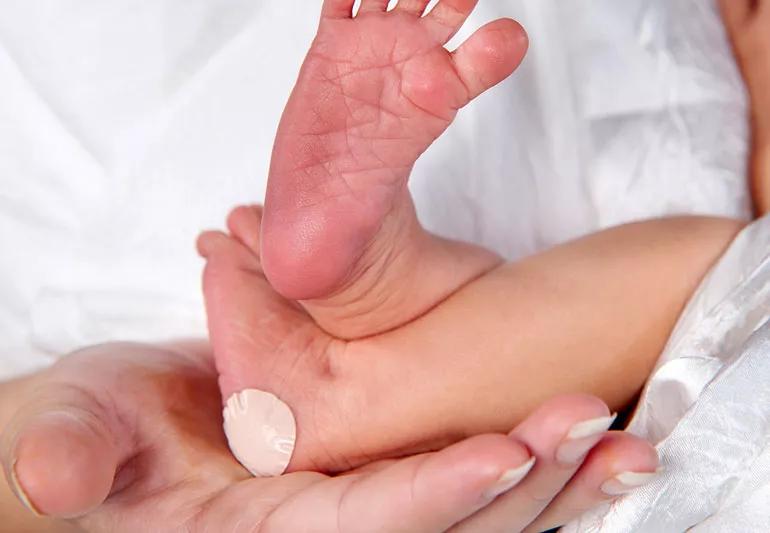PKU or blood spot test finds hidden conditions early when treatment can be initiated

Image content: This image is available to view online.
View image online (https://assets.clevelandclinic.org/transform/6132ccf0-3a7c-49df-b220-318f4dff4b2a/newbornHeelPrick-182213085-770x553-1_jpg)
newborn with heel prick and bandaid
When your baby is born, there are many firsts: a first breath, a first touch. If your baby is born in a hospital, they’ll also receive their first series of health screenings.
Advertisement
Cleveland Clinic is a non-profit academic medical center. Advertising on our site helps support our mission. We do not endorse non-Cleveland Clinic products or services. Policy
Every state in the United States requires newborns to have certain health tests. A hearing test is required by law in certain states, for example, and a pulse oximetry test determines the level of oxygen in an infant’s blood. An abnormal oxygen level can indicate a critical heart malformation.
About 24 hours after your baby is born before you’re discharged from the hospital, a nurse will administer a “heel prick” test to look for indications in the blood of rare medical conditions, such as phenylketonuria or PKU. We asked pediatrician Thomas Phelps, MD, what else parents need to know about the newborn screening panel.
Newborn screening got its start in the 1960s when scientists developed a blood test for PKU, an amino acid disorder. “Babies with PKU appear perfectly healthy at first,” says Dr. Phelps. “But if their condition isn’t treated soon after birth by changing their milk supply, they will eventually experience a host of serious health issues including the possibility for developmental delays, brain damage and even death,” he says.
Over time, states added tests for other conditions besides PKU to this heel prick test. In particular, they test for conditions that aren’t obvious at birth and are treatable before it is too late and symptoms appear.
Advertisement
“Knowing whether your baby has one of these conditions before symptoms appear can make a huge difference in your baby’s health,” Dr. Phelps says. “In fact, early treatment, which can sometimes involve something as simple as a change in diet, can prevent how the disease affects your child as an infant and throughout their whole life,” he says.
In general, doctors arrange for testing when a newborn is between 24 and 48 hours old. If your baby is born in a hospital, the staff will test your baby before you’re released to go home. If you give birth at home, a midwife should do the test at home 24 hours from birth. “If you have a home birth, you can also take your newborn to a local hospital for the screening 24 hours after they’re born and within two to three days,” says Dr. Phelps.
A nurse or medical technician will draw blood from your baby’s heel and send it off to a state lab for testing. “Ideally your infant should be fed prior to the test,” says Dr. Phelps. Your pediatrician will let you know if the screening results show any issues, usually within a week.
But the screening is not a diagnostic tool, Dr. Phelps says. “If anything shows up as abnormal, the test will be repeated to confirm,” says Dr. Phelps. He clarifies: “Some tests will be normal on repeat testing. After the child’s physician or specialist verifies the test results, the specialist will set up a care plan for treatment and close follow up.”
Each state determines which conditions the newborn screenings will test for, Dr. Phelps says. Health officials typically take into account both national health recommendations and what conditions are most common in each region based on population genetics. Most states test for PKU (present in 1 in 10,000 to 15,000 births), but many also test for:
Advertisement
That tiny heel prick can reveal so many illnesses that can potentially be life-threatening or can potentially be physically and intellectually damaging. Regardless of what conditions your state screens for, hospitals offer the newborn screening panel to help all babies get the best start possible. “The conditions screenings look for are rare, but sometimes serious,” says Dr. Phelps. “Finding them early offers the best chance for your baby to grow and thrive.”
Advertisement

Sign up for our Health Essentials emails for expert guidance on nutrition, fitness, sleep, skin care and more.
Learn more about our editorial process.
Advertisement
Placenta consumption hasn’t been shown to have any health benefits, but it can cause infections
Sitting, squatting and side-lying may provide a more comfortable labor and delivery
Use relaxation techniques and breathwork to help manage the discomforts of a medication-free birth
Rinses, sitz baths, ice and medication can help the healing
Babies aren’t great about scheduling, so be sure to pack a month or two before your due date
Having a baby after a loss can bring unexpected emotions
No one can predict exactly how your labor will go — but you can share your preferences
An expert explains delayed cord clamping, including risks and benefits
Prioritize your health by managing stress, strengthening your social connections and getting quality sleep
Bolsters, blankets, pillows and blocks can offer extra support, stability and comfort
Allergies, postnasal drip, asthma or reflux could be to blame for a cough that won’t quit